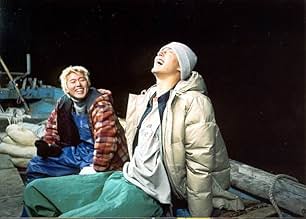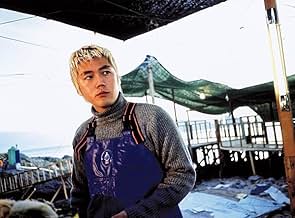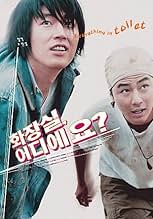AVALIAÇÃO DA IMDb
5,5/10
303
SUA AVALIAÇÃO
Adicionar um enredo no seu idiomaThe story of Dong Dong, the God of Public Toilets - so called because he was born and abandoned by his mother in a public toilet and later rescued out of the sewage by his grandmother.The story of Dong Dong, the God of Public Toilets - so called because he was born and abandoned by his mother in a public toilet and later rescued out of the sewage by his grandmother.The story of Dong Dong, the God of Public Toilets - so called because he was born and abandoned by his mother in a public toilet and later rescued out of the sewage by his grandmother.
- Direção
- Roteiristas
- Artistas
- Prêmios
- 3 vitórias e 7 indicações
- Direção
- Roteiristas
- Elenco e equipe completos
- Produção, bilheteria e muito mais no IMDbPro
Enredo
Avaliação em destaque
Dong Dong is the God of Toilets. He was born in a toilet, he lives near a toilet and he understands life through toilets. The public toilet is a way of understanding world cultures whether it's his friends (Chinese, Japanese, Italian, Somali) or around the world. The public toilet is unique to its surroundings, which, as a common and natural function, is ultimately above judgment. Disdain and even disgust at other culture's public toilets can even be jingoistic.
"Public Toilet" is a film by Fruit Chan who has taken his internal camera and externalized it, audience be damned. The idea of the public toilet is the thread that goes from surface to subtext to depth and back. He's not interested in making a linear film and in the end has created something of a lo-fi epic. Using Digital Video with little or no concern to aesthetic quality or standard practices, he has made something beautiful and not just because of it's projected realism. The footage is ugly as hell at times and the repetition of dirty footage becomes a style of it's own. Ultimately, it becomes appealing in the way that Super 8 home movies have become beautiful. Chan is years ahead of his time.
Shot on location at the Great Wall, Hong Kong, Beijing, Korea, Rome, India, the variety of images are blunt and fluctuate in the filth of DV. But this helps to tell the story. Hey, it's a film called "Public Toilet". Were you expecting Merchant / Ivory? Spanning three continents, the film follows the lives of three different groups. The first is Dong Dong and his pals. His grandma is in a coma. His friend, Tony's little brother is also in the hospital with no cure. The two set off in different directions to find cures. The trip leads them across three continents and finds only existential solutions. Tony travels in India where he finds two brothers who speak Cantonese. They're going to India for the first time to help their dying father and to bathe in the Ganji. Dong Dong goes to Korea where he seeks a number of solutions.
This tangentially connects him with another story of a young Korean man who finds a woman living in his outdoor porta-toilet. Taking her to a doctor, he finds she has no bones. She claims to be a creature of the sea and therefore is like him and alien at the same time. For this, he thinks she is from the North. His best friend is also ill and takes off on a trip to find his own cure. Knowing he only has about ten years to live, he says a final good-bye to his friend not wanting to put that off for a decade.
Dong Dong travels to New York to find his cure. In Times Square he is almost oblivious speaking on his cell phone and standing in a tunnel of snow that connects him to the snow in China outside of the public toilet. While there, he meets a Chinese hit-man on his last job. He's quitting at the request of his girlfriend. She is at the Great Wall looking for a healer to help her ill mother.
Another story involves Dong Dong's friend who has returned to Italy but that story seems to have been cut short because of the tragic death of actor Pietero Dilleti.
Terminal illness is a theme that Fruit Chan has visited before and it represents Hong Kong and China's future. Not based around Hong Kong, in this film it takes the form of new China searching out its identity and future. Pusan is false histories. Manhattan is violent death for cash. India is the possibility of rebirth. But none dominate and the answer isn't provided or even supposed by the filmmaker.
"Public Toilet" is a film by Fruit Chan who has taken his internal camera and externalized it, audience be damned. The idea of the public toilet is the thread that goes from surface to subtext to depth and back. He's not interested in making a linear film and in the end has created something of a lo-fi epic. Using Digital Video with little or no concern to aesthetic quality or standard practices, he has made something beautiful and not just because of it's projected realism. The footage is ugly as hell at times and the repetition of dirty footage becomes a style of it's own. Ultimately, it becomes appealing in the way that Super 8 home movies have become beautiful. Chan is years ahead of his time.
Shot on location at the Great Wall, Hong Kong, Beijing, Korea, Rome, India, the variety of images are blunt and fluctuate in the filth of DV. But this helps to tell the story. Hey, it's a film called "Public Toilet". Were you expecting Merchant / Ivory? Spanning three continents, the film follows the lives of three different groups. The first is Dong Dong and his pals. His grandma is in a coma. His friend, Tony's little brother is also in the hospital with no cure. The two set off in different directions to find cures. The trip leads them across three continents and finds only existential solutions. Tony travels in India where he finds two brothers who speak Cantonese. They're going to India for the first time to help their dying father and to bathe in the Ganji. Dong Dong goes to Korea where he seeks a number of solutions.
This tangentially connects him with another story of a young Korean man who finds a woman living in his outdoor porta-toilet. Taking her to a doctor, he finds she has no bones. She claims to be a creature of the sea and therefore is like him and alien at the same time. For this, he thinks she is from the North. His best friend is also ill and takes off on a trip to find his own cure. Knowing he only has about ten years to live, he says a final good-bye to his friend not wanting to put that off for a decade.
Dong Dong travels to New York to find his cure. In Times Square he is almost oblivious speaking on his cell phone and standing in a tunnel of snow that connects him to the snow in China outside of the public toilet. While there, he meets a Chinese hit-man on his last job. He's quitting at the request of his girlfriend. She is at the Great Wall looking for a healer to help her ill mother.
Another story involves Dong Dong's friend who has returned to Italy but that story seems to have been cut short because of the tragic death of actor Pietero Dilleti.
Terminal illness is a theme that Fruit Chan has visited before and it represents Hong Kong and China's future. Not based around Hong Kong, in this film it takes the form of new China searching out its identity and future. Pusan is false histories. Manhattan is violent death for cash. India is the possibility of rebirth. But none dominate and the answer isn't provided or even supposed by the filmmaker.
- honeybearrecords
- 10 de mar. de 2005
- Link permanente
Principais escolhas
Faça login para avaliar e ver a lista de recomendações personalizadas
Detalhes
- Tempo de duração1 hora 42 minutos
- Cor
Contribua para esta página
Sugerir uma alteração ou adicionar conteúdo ausente

Principal brecha
By what name was Banheiro Público (2002) officially released in Canada in English?
Responda











